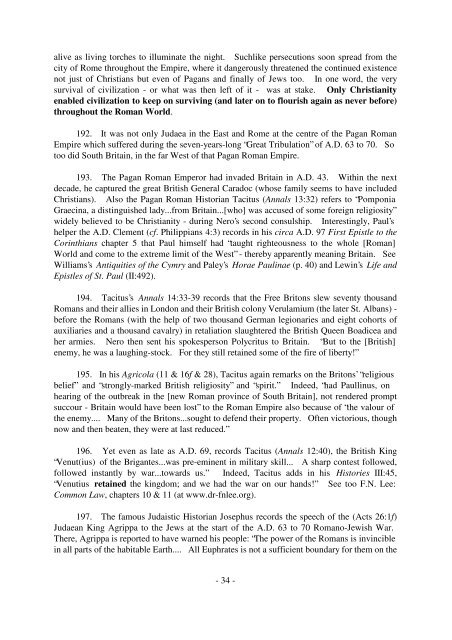JERUSALEM; ROME; REVELATION - The Preterist Archive
JERUSALEM; ROME; REVELATION - The Preterist Archive
JERUSALEM; ROME; REVELATION - The Preterist Archive
Create successful ePaper yourself
Turn your PDF publications into a flip-book with our unique Google optimized e-Paper software.
alive as living torches to illuminate the night. Suchlike persecutions soon spread from the<br />
city of Rome throughout the Empire, where it dangerously threatened the continued existence<br />
not just of Christians but even of Pagans and finally of Jews too. In one word, the very<br />
survival of civilization - or what was then left of it - was at stake. Only Christianity<br />
enabled civilization to keep on surviving (and later on to flourish again as never before)<br />
throughout the Roman World.<br />
192. It was not only Judaea in the East and Rome at the centre of the Pagan Roman<br />
Empire which suffered during the seven-years-long “Great Tribulation” of A.D. 63 to 70. So<br />
too did South Britain, in the far West of that Pagan Roman Empire.<br />
193. <strong>The</strong> Pagan Roman Emperor had invaded Britain in A.D. 43. Within the next<br />
decade, he captured the great British General Caradoc (whose family seems to have included<br />
Christians). Also the Pagan Roman Historian Tacitus (Annals 13:32) refers to “Pomponia<br />
Graecina, a distinguished lady...from Britain...[who] was accused of some foreign religiosity”<br />
widely believed to be Christianity - during Nero’s second consulship. Interestingly, Paul’s<br />
helper the A.D. Clement (cf. Philippians 4:3) records in his circa A.D. 97 First Epistle to the<br />
Corinthians chapter 5 that Paul himself had “taught righteousness to the whole [Roman]<br />
World and come to the extreme limit of the West” - thereby apparently meaning Britain. See<br />
Williams’s Antiquities of the Cymry and Paley’s Horae Paulinae (p. 40) and Lewin’s Life and<br />
Epistles of St. Paul (II:492).<br />
194. Tacitus’s Annals 14:33-39 records that the Free Britons slew seventy thousand<br />
Romans and their allies in London and their British colony Verulamium (the later St. Albans) -<br />
before the Romans (with the help of two thousand German legionaries and eight cohorts of<br />
auxiliaries and a thousand cavalry) in retaliation slaughtered the British Queen Boadicea and<br />
her armies. Nero then sent his spokesperson Polycritus to Britain. “But to the [British]<br />
enemy, he was a laughing-stock. For they still retained some of the fire of liberty!”<br />
195. In his Agricola (11 & 16f & 28), Tacitus again remarks on the Britons’ “religious<br />
belief” and “strongly-marked British religiosity” and “spirit.” Indeed, “had Paullinus, on<br />
hearing of the outbreak in the [new Roman province of South Britain], not rendered prompt<br />
succour - Britain would have been lost” to the Roman Empire also because of “the valour of<br />
the enemy.... Many of the Britons...sought to defend their property. Often victorious, though<br />
now and then beaten, they were at last reduced.”<br />
196. Yet even as late as A.D. 69, records Tacitus (Annals 12:40), the British King<br />
“Venut(ius) of the Brigantes...was pre-eminent in military skill... A sharp contest followed,<br />
followed instantly by war...towards us.” Indeed, Tacitus adds in his Histories III:45,<br />
“Venutius retained the kingdom; and we had the war on our hands!” See too F.N. Lee:<br />
Common Law, chapters 10 & 11 (at www.dr-fnlee.org).<br />
197. <strong>The</strong> famous Judaistic Historian Josephus records the speech of the (Acts 26:1f)<br />
Judaean King Agrippa to the Jews at the start of the A.D. 63 to 70 Romano-Jewish War.<br />
<strong>The</strong>re, Agrippa is reported to have warned his people: “<strong>The</strong> power of the Romans is invincible<br />
in all parts of the habitable Earth.... All Euphrates is not a sufficient boundary for them on the<br />
- 34 -
















